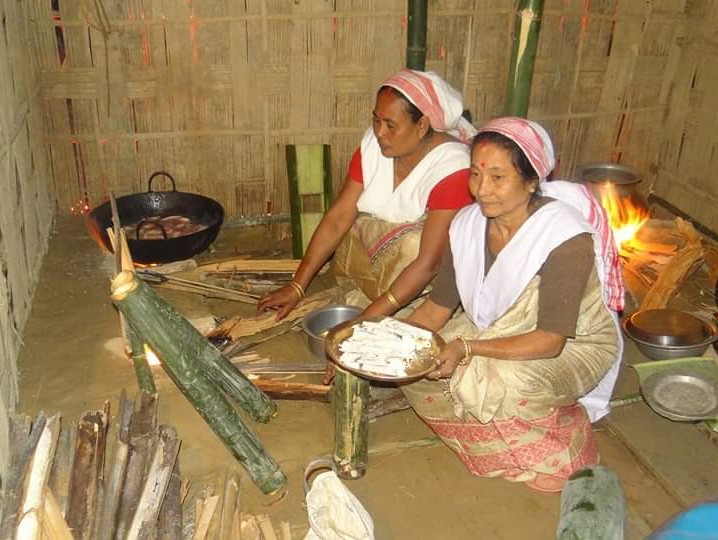In Assamese, “No” translates to “New,” and “Khuwa” means “to eat,” so together they imply “New Things to Eat.” In Assam, approximately 80% of the population relies on agriculture, either directly or indirectly. Most of the agricultural land is owned by small and marginal farmers. Rice is the primary crop in Assam, forming the staple diet of the Assamese people.
“No Khuwa,” which is essentially a feast, is a well-known and beloved celebration, especially in the rural areas of Assam. This festival occurs in October-November, marking the end of the harvesting season. During this time, local communities gather to partake in the feast known as No Khuwa. The festival is celebrated to enjoy the first taste of newly harvested crops, particularly rice. The host invites neighbors and relatives to join in the festivities. Assamese people have a strong preference for non-vegetarian dishes, so the feast often includes a variety of non-veg items, especially fish and duck meat. This celebration is also a way for people to express gratitude to God for the bountiful harvest.
In some rural areas, the celebration takes place collectively in Naamghar, a traditional religious gathering place for Assamese people. Community members bring newly harvested rice and other foods from their homes, and the Naamghariya (person responsible for the Naamghar) prepares the meal for everyone to share. It is believed that those who do not participate in the No Khuwa celebration are not permitted to taste the newly harvested crops.
Origins and Meaning of “No Khuwa”
1. Etymology:
- The term “No Khuwa” combines two Assamese words:
- “No”: Meaning “new.”
- “Khuwa”: Referring to “eating” or “feasting.”
- Together, they signify the act of enjoying freshly harvested food.
2. Joy of Tasting Freshly Harvested Crops:
- “No Khuwa” is a post-harvest feast celebrated in rural Assam.
- It marks the end of the harvest season, usually around October-November.
- Families come together to share a communal meal, rejoicing in the abundance of crops.
- Imagine the pleasure of savoring just-harvested rice, vegetables, and fish—the flavors bursting with vitality.
3. Connection to Assam’s Agrarian Lifestyle:
- Assam’s economy relies heavily on agriculture.
- The majority of Assamese people are farmers or have close ties to farming.
- “No Khuwa” embodies gratitude for the land’s fertility and the hard work put into cultivation.
- It reinforces the bond between the community and the earth that sustains them.
Harvest Season and Preparation for “No Khuwa”
- Timing (Usually October-November):
- “No Khuwa” is celebrated after the harvest season, typically in October or November.
- As the crops are gathered, families eagerly anticipate this communal feast.
- Community Gathering:
- Families and neighbors come together to celebrate.
- The entire village participates, reinforcing community bonds.
- It’s a time for sharing stories, laughter, and gratitude.
- Preparations:
- Cleaning: Homes and communal spaces are thoroughly cleaned.
- Cooking: Traditional Assamese dishes are prepared:
- Newly harvested rice: The centerpiece of the feast.
- Fish delicacies: A staple in Assamese cuisine.
- Duck meat: A favorite.
- Fresh vegetables: Picked from the fields.
- Setting Up Communal Spaces:
- Naamghars (ritual places) become the focal points.
- Colorful mats and low wooden tables are arranged.
- Everyone contributes to the setup.
The Feast Itself
- Communal Gathering:
- Picture a vibrant scene: families, friends, and neighbors gathered in Naamghars (ritual places).
- Colorful mats are spread out, and low wooden tables are set up.
- Laughter and anticipation fill the air.
- Traditional Foods:
- Newly Harvested Rice: The star of the show. It symbolizes prosperity and abundance.
- Fish Delicacies: Assamese cuisine is incomplete without fish. Varieties like masor tenga (sour fish curry) grace the table.
- Duck Meat: Tender and flavorful, it’s a favorite among locals.
- Fresh Vegetables: Picked straight from the fields—crisp and full of life.
- Communal Eating Experience:
- Imagine the joy of sharing food with loved ones.
- Elders pass down stories and traditions to the younger generation.
- Songs, dances, and cultural performances add to the festive atmosphere.
In summary, “No Khuwa” isn’t just about food; it’s about gratitude, community, and the simple pleasure of breaking bread together.
Gratitude and Community Bonding
1. Spiritual Aspect: Thanking God for the Bountiful Harvest
- Thanksgiving Ritual:
- During “No Khuwa,” Assamese families gather to express gratitude for the abundant harvest.
- The act of tasting new crops symbolizes hope, continuity, and blessings from the divine.
- It’s a moment of reflection, acknowledging the interconnectedness of nature and human sustenance.
2. Strengthening Community Ties
- Neighbors Sharing Food and Stories:
- No Khuwa brings neighbors together, transcending boundaries.
- Families open their doors, inviting others to partake in the feast.
- Conversations flow, stories are exchanged, and laughter echoes through the air.
- Passing Down Traditions:
- Elders play a pivotal role during No Khuwa.
- They share folklore, wisdom, and ancestral customs with the younger generation.
- It’s a beautiful blend of heritage and continuity.
- Songs, Dances, and Cultural Performances:
- No Khuwa isn’t just about food; it’s a celebration of Assamese culture.
- Folk songs resonate, and traditional dances enliven the atmosphere.
- Performances honor the land, the harvest, and the shared history.
Conclusion
“No Khuwa” is more than just a traditional event; it is a vibrant celebration of Assamese culture and identity. This festival, rooted in the agricultural practices of Assam, showcases the deep connection the people of this region have with their land and traditions. Through the rituals, music, dance, and communal feasting that mark “No Khuwa,” the essence of Assamese life is brought to the forefront, reinforcing the values of unity, gratitude, and reverence for nature.



